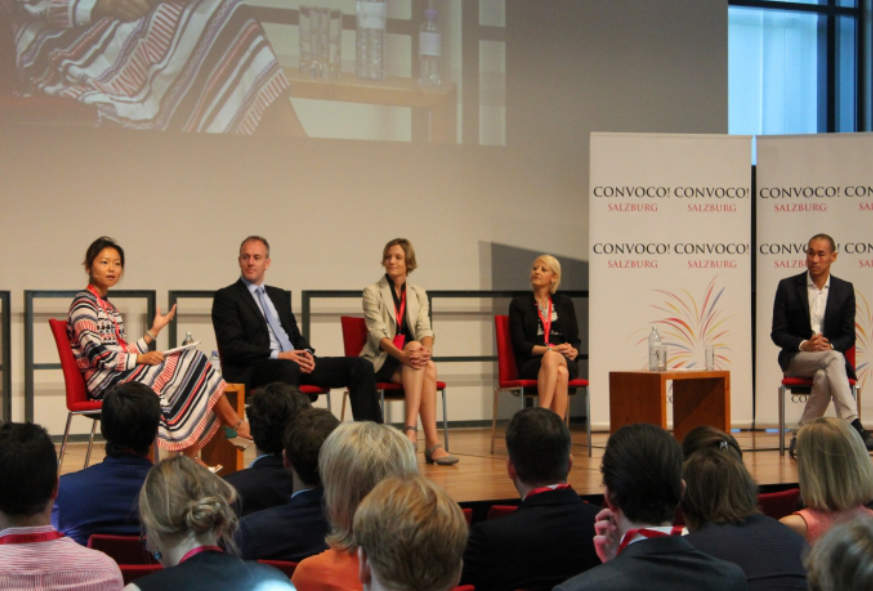Our inaugural Convoco 3.0 panel about “How Blockchain Technology impacts our Social and Economic Environment” was a great success. Here are selected statements.
What is a blockchain?
A blockchain is a digital ledger where transactions are recorded, saved as individual blocks and strung together like beads on a chain. The revolution lies in the distribution: transactions are only recorded as completed when agreed and validated by multiple participants (nodes). This creates transparency and security. Even if some computers are tampered with, there are still millions of others who can detect the fraud.
The big advantage is the speed: transactions can be completed within seconds. At the moment, the biggest blockchain applications are digital currencies such as Bitcoin.
Blockchain technologies are both social and disruptive by design. They enable us to take seriously bold ideas such as money without banks, asset trading without stock exchanges, verifiable identities without government-issued IDs, and transparent and citizen-accountable public institutions. These tech developments promise to transform the organization of our collective lives. At the same time, their de- centralized and encrypted nature raises questions concerning consumer protection, financial system integrity and data privacy. JULIE MAUPIN, Max-Planck Institute for Comparative Public Law and International Law
Generally, in the systems we have in the world, we have the law. It is essentially this construct we have built up over hundreds of years to protect the mechanical systems that we built in the world. Bitcoin started out as a lawless area that tried to distance itself from government and authority. I don’t believe that blockchains can be detached from the law. There has to be some interface point between people and the real world and that’s where the law comes in. BRUCE PON, Founder and CEO, BigchainDB
We can currently find a lot of disengagement and discontentment with government. When large numbers do feel discontented we look for other alternatives. Blockchains enable this. We can get around banks, get around government tracking, intellectual property rules. People who are trapped behind nation-state borders, who cannot vote, who cannot get ID try to see what parts of their daily life they can transfer outside these borders when they are limited by them. JULIE MAUPIN
“What blockchains allow is the digitization of any asset. The lag time of getting an asset from A to B digitally will become zero. This poses the question: how do you manage risks and regulation when the time is so compressed?”
Bruce Pon
Technologies based on blockchain are often regarded as promoting democracy and equality because of their transparency. However, inbuilt in the technology is already a type of inequality. Algorithms are made by people and they are made based on market structures, and markets bring with them inequality. The greater your knowledge of the technology, the more advantages and political power you will have. We need mechanisms to compensate for this, but we do not have that in the blockchain, because we cannot intervene. You risk a technocratic system. MARCELLA ATZORI, University College of London, Research Centre for Blockchain Technologies
Transformation of authority is closely linked to the transformations in digital society. Technologies such as blockchain and smart contracts fuel the digital natives’ hopes that one day transactions can be carried out lightning-fast, largely without any nation state and national borders, but rather with the help of crowd intelligence and under the control of clever algorithms. THOMAS HOEREN, Institute for Information, Telecommunication and Media Law
So, where do we go from here? Global players seem to be worried: A bank consortium with Deutsche Bank, UBS and others has formed the blockchain company “R3” to further develop the technology for their purposes. The “Big Four“ like Deloitte and PWC also coordinate their efforts.
Progress is mainly accelerated by companies like Microsoft, offering their cloud technologies to install blockchains. CONVOCO
If you have been missing out on blockchain: Was ist eigentlich die Blockchain (FAZ, 2 September 2016)… …and if you want to amuse yourself read about the new authority in our lives: Google, big data and the end of free will (FT, 26 August 2016)


